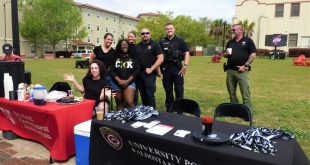Written By: Jordan Hill
The Women’s and Gender Studies program and VSU administrators are airing a different type of dirty laundry this year.
Because of a dispute between WGST and VSU’s top administrators, the program will not hang T-shirts on clotheslines to create awareness of sexual assault and domestic violence for the first time in 14 years.
The Clothesline Project began at VSU in 2000 when Dr. Tracy Meyers, director of Women’s and Gender Studies and the Clothesline Project, was a professor in the sociology department. Students made T-shirts of their story or someone else’s story of abuse/violence as a class assignment. When Dr. Meyers became the interim director of the WGST program in 2005, she began displaying them publicly on the Front Lawn and the Pedestrian Mall.
According to Dr. Meyers, VSU President William McKinney and Provost Hudson Rogers told her in separate meetings that she could not hang the shirts on VSU property because of a Board of Regents policy.
However, according to Dr. Kimberly Luse, VSU’s Chief of Staff, that directive was never given.
“No one in administration has been involved in any decision related to this important event,” she said.
Dr. Meyers disputes Dr. Luse’s comment.
“I was told in July by Dr. Rogers that I, as the director of the Women’s and Gender Studies program, could not use state resources for political purposes,” she said.
Dr. Meyers inferred those state resources to be computers, email accounts, campus structures, etc. According to Dr. Meyers, Dr. Rogers told her she needs to use her personal email account to participate in social justice actions and to do so as a private citizen because using state resources for such political endeavors is against BOR policy.
The discussion between Dr. Meyers and Dr. Rogers came about after VSU adjunct professor Dr. Mark George sent an email from his VSU account to the governor and general assembly per a social justice action.
VSU received complaints about Dr. George, citing violations of the BOR policy that forbids employees to use state resources for political purposes. Eventually, VSU shut down Dr. George’s email account. Dr. George argued that their decision was politically motivated.
Dr. Meyers then wrote a letter to Dr. McKinney on Aug. 25 after her meeting with Dr. Rogers, explaining her disappointment in VSU’s decision regarding Dr. George’s political efforts.
“Dr. Rogers stated I could sign these types of petitions (taking action on behalf of issues concerning women, etc.), but I should do so using a personal email account and as a private citizen, not the director of WGST,” Dr. Meyers wrote to Dr. McKinney. “If we follow this logic, then that means the WGST program will not be allowed to display the Clothesline Project.
“Social justice is part of the WGST program’s identity, it is part of our mission, and it is now a part of the University’s mission,” she wrote.
Dr. Meyers said that letter prompted a meeting with Dr. McKinney in August.
In the meeting, Dr. McKinney said he would ask the BOR attorney for the policy that does not allow the Clothesline Project to take place. Dr. Meyers said she never received that policy.
On Tuesday, Dr. Luse emailed a BOR policy that refers to political processes to Dr. Meyers.
According to Dr. Meyers, the policy that Dr. Luse produced only discusses political campaigning.
“It doesn’t address the policy that the provost and president spoke to me and Dr. George about this summer,” she said.
Dr. Meyers believes the policy that supports the decision is different than what Dr. Luse produced to her. The policy Dr. Luse presented refers to political campaigning rather than the use of employees’ email for political activity.
“Everything that the WGST program does is political,” Dr. Meyers explained. “I am very disappointed that the WGST program and my fellow activist scholars are not allowed to carry out our departmental, university, and professional organizations’ mission of social justice work because of what comes down to a BOR policy that has yet to be produced. I find myself at a loss for words to describe how unfortunate I believe this situation to be.”
Dr. Luse said no one in the administration has been involved in the decision to ban the Clothesline Project at VSU.
“For the record, the administration has always been and continues to be staunch supporters of the Clothesline Project,” she said. “The focus should remain on the positive impact it has for raising awareness for these important issues. It would be irresponsible not to keep that focus or to erroneously report that the president, provost, or anyone in administration would not support this good work.”
The WGST program tied the clotheslines up and hung signs explaining why the clotheslines had no T-shirts as usual.
Dr. McKinney and Dr. Rogers were not available for comment on Wednesday. All inquiries were directed to Dr. Luse.
The BOR Policy that Dr. Luse cited:
- Employees may not manage or take an active part in a political campaign which interferes with the performance of duties or services for which he or she receives compensation from the System.
- Employees may not hold elective political office at the state or federal level.
- A candidate for or holder of an elective political office at the state or federal level may not be employed or hold a faculty, staff, or other position at an institution of the System, with or without compensation.
- Employees seeking elective political office at the state or federal level must first request a leave of absence without pay beginning prior to qualification as a candidate in a primary or general election and ending after the general or final election. If elected to state or federal office such person must resign prior to assuming office.
- Employees may seek and hold elective office at other than the state or federal level, or appointive office, when such candidacy for or holding of the office does not conflict or interfere with the employee’s duties and responsibilities to the institution or the System.”
 The Spectator The independent student newspaper of Valdosta State University
The Spectator The independent student newspaper of Valdosta State University








Would this also include not being able to have the annual Vagina Monolouges that are performed every spring? This also is a very political statement that everyone including students and faculty are involved in. I’m not seeing a clear difference in the statements being made about that and the statements being made about the t shirt project.